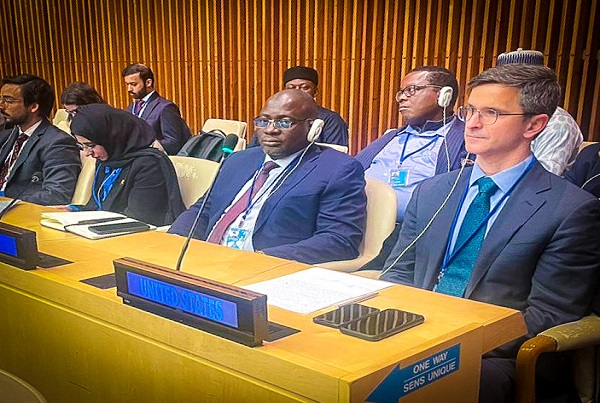The Federal Inland Revenue Service (FIRS) has called on the United Nations and the International Tax Community to forge an inclusive, equitable, fair, and universally beneficial international tax system toward the attainment of the 2030 Sustainable Development Goals (SDGs).
The FIRS Chairman, Muhammad Nami, made the call while delivering Nigeria’s statement at the Economic and Social Council (ECOSOC) Special Meeting on International Cooperation in Tax Matters, held at the ECOSOC Chamber, United Nations Headquarters in New York on Friday, March 31.
Nami noted that the Nigerian delegation was concerned about the global minimum tax as put forward by the OECD – Inclusive Framework, because of its low rate and the way it was negotiated to benefit the home countries of multinationals.
“My delegation is concerned about the global minimum tax because of its low rate and the way it was negotiated to benefit the home countries of multinationals, which are mostly in developed countries,” he stated.
Speaking further, the head of Nigeria’s apex tax authority urged the meeting to discuss how “a UN instrument on tax cooperation can both build on work that has already been done in a way that guarantees fairness and equity.”
READ ALSO: FIRS generated N10.04trn in 2022 – Controller
He said Nigeria looks forward to views on “enforcement mechanisms for a binding multilateral tax convention, noting the challenges that developing and developed countries have experienced with investment treaty arbitration.”
Nami stated that the capacity of countries to attain the 2030 Sustainable Development Goals were hinged on having the requisite funding “in delivering critical public services” towards the SDGs.
The FIRS boss, while calling for a global taxation regime under the United Nations, harped on the importance of enhancing domestic resource mobilisation among member states to address their economic challenges.
“The promotion of inclusive International Tax Cooperation remains a critical subject in the attainment of the 2030 Sustainable Development Goals (SDGs).
“Today a global taxation regime under the UN is urgently needed to enable States effectively mobilise domestic revenues to address the multiple economic and other crises impacting our efforts in the achievement of the 2030 SDGs.
“Domestic public resource mobilisation is critical to this effort because of its vital role in delivering critical public services and advancing even progress towards the sustainable development agenda.
“Developing countries are taking seriously the challenge of financing sustainable development. My delegation underscores the importance of enhancing domestic resource mobilisation, good governance, and investment in our common African goal embodied in the Agenda 2063, and in the global goals spelled out in the 2030 Agenda,” Nami added.
He further commended African countries for strengthening their participation in international tax cooperation efforts, as well as the strides they have made “in closing loopholes and countering base erosion and profit shifting.”
He however expressed concerns that “while much good work has been done, much more remains to be made towards a fully inclusive process, both domestically and internationally, and ensuring that all taxpayers are making their fair contributions.”
- Thiago Silva to leave Chelsea after 4 years - April 29, 2024
- Gospel singer Moses Bliss gifts signees new cars - April 29, 2024
- Zenith Bank shareholders approve HoldCo structure as Ovia lauds investors - April 29, 2024










